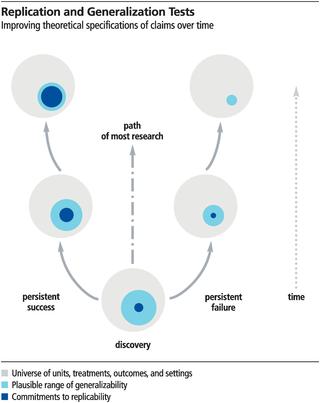PLOS Biology ( IF 7.8 ) Pub Date : 2020-03-27 , DOI: 10.1371/journal.pbio.3000691 Brian A Nosek 1, 2 , Timothy M Errington 1

|
Credibility of scientific claims is established with evidence for their replicability using new data. According to common understanding, replication is repeating a study’s procedure and observing whether the prior finding recurs. This definition is intuitive, easy to apply, and incorrect. We propose that replication is a study for which any outcome would be considered diagnostic evidence about a claim from prior research. This definition reduces emphasis on operational characteristics of the study and increases emphasis on the interpretation of possible outcomes. The purpose of replication is to advance theory by confronting existing understanding with new evidence. Ironically, the value of replication may be strongest when existing understanding is weakest. Successful replication provides evidence of generalizability across the conditions that inevitably differ from the original study; Unsuccessful replication indicates that the reliability of the finding may be more constrained than recognized previously. Defining replication as a confrontation of current theoretical expectations clarifies its important, exciting, and generative role in scientific progress.
中文翻译:

什么是复制?
科学主张的可信度是通过使用新数据证明其可复制性的证据来确定的。根据通常的理解,重复是重复研究的过程并观察先前的发现是否再次出现。这个定义很直观,易于应用,而且是不正确的。我们建议,复制是一项研究,任何结果都将被视为有关先前研究主张的诊断证据。这一定义减少了对研究操作特征的重视,并增加了对可能结果的解释的重视。复制的目的是通过用新的证据对抗现有的理解来推进理论。讽刺的是,当现有理解最薄弱时,复制的价值可能最强。成功的复制提供了在不可避免地与原始研究不同的条件下的普遍性的证据;不成功的重复表明该发现的可靠性可能比之前认识到的更受限制。将复制定义为对当前理论期望的对抗,阐明了它在科学进步中的重要、令人兴奋和生成性的作用。











































 京公网安备 11010802027423号
京公网安备 11010802027423号